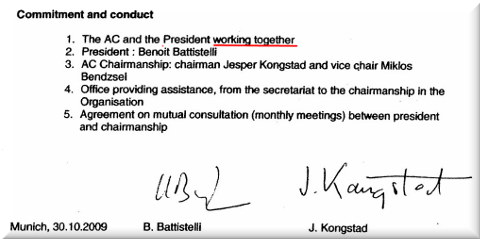

THE European Patent Organisation (EPO) and Office are almost indistinguisable, as the head of the Organisation recently became the deputy of the Office's head, António Campinos. So we're back in the rather appalling position that Jesper Kongstad and Battistell created nearly a decade ago. Nothing has changed. There's no oversight; it is more like a collusion. The Boards of Appeal feel the same way as they too are indirectly bossed by the Office, which in turn controls the Council -- the very opposite of what authors of the European Patent Convention (EPC) intended.
epo.org link) late on Friday, as usual: (when media isn't paying much attention)
In the 159th meeting of the Administrative Council, the representatives of the 38 EPO Contracting States together with the European Patent Office discussed the need to find a solution in the short term following the decision T 1063/18.
The Contracting States expressed their concerns with regard to the legal uncertainty caused by decision T 1063/18. The President of the EPO expressed his view that a President's referral of the case to the Enlarged Board of Appeal is justified and necessary. The aim is to obtain an opinion from the Enlarged Board of Appeal on the patentability of plants exclusively obtained by essentially biological processes, hereby considering recent legal developments (interpretations and statements of the European Commission, the EU Council, European Parliament and EPO's Administrative Council on the interpretation of the European Patent Convention and the EU Bio-Directive, all of them concluding that there should be no patentability in these cases).
European Patent Office (EPO) president António Campinos has said that a president’s referral on a board of appeals case regarding the patentability of conventionally bred plants and animals is justified and necessary.
Following a meeting of the office’s Administrative Council, representatives expressed concerns to Campinos over the legal uncertainty caused by a Board of Appeal ruling in the revocation of a pepper plant.
The case in dispute is T1063/18, in which Agrochemical company Syngenta appealed a denial of its patent application for a pepper plant.
Focus on the EPO in recent months has overwhelmingly revolved around the granting of patents covering conventionally bred plants and animals.
‘The aim is to obtain an opinion (…) on the patentability of plants exclusively obtained by essentially biological processes, hereby considering recent legal developments (interpretations and statements of the European Commission, the EU Council, European Parliament and EPO’s Administrative Council on the interpretation of the European Patent Convention and the EU Bio-Directive, all of them concluding that there should be no patentability in these cases).’
According to the press release, Campinos announced that the EPO ‘will proceed swiftly to submit the referral. The EPO endeavours to restore legal certainty fully and speedily in the interest of the users of the European patent system and the general public.’
As reported earlier on this blog, an EPO Board of Appeal decided on 5 December 2018 that plants which are produced according to essentially biological processes need to be held patentable, despite EPO Guidelines which were introduced in 2017 to exclude them from patentability.